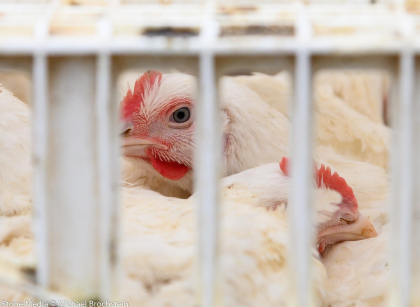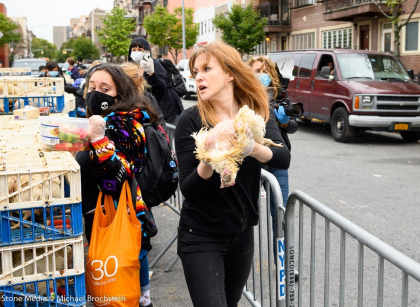Kaporos is a ritual that takes place in the days leading up to Yom Kippur, the holiday of atonement that follows the Jewish New Year (generally around September-October). Originating in the 7th century, the ritual involves swinging chickens or coins around a participant’s head three times while a prayer is recited.
This mystical rite serves as a substitution of judgment:
This is my exchange, this is my substitute, this is my expiation.
זֶה חֲלִיפָתִי, זֶה תְּמוּרָתִי, זֶה כַּפָּרָתִי
The full ritual of kaporos concludes with the donation of the money or the chicken as tzedakah (charity).
Nowadays, most Jews who practice kaporos do so with money. However, a small portion of Jewish communities, particularly in Brooklyn, New York, still use chickens for their practice.
Approximately 50,000 birds are trucked into the city in tiny crates without access to food, water, or medical care.

Practitioners who are unused to handling chickens will often hold them by their delicate wings, causing significant pain and injury.
And though the ritual is meant to provide for those in need, the birds’ bodies typically end up discarded in the streets.

Jewish law commands us to prevent the suffering of animals, to care for the health and safety of ourselves and our communities, and not to waste the Earth’s resources.
That’s why we’ve partnered with the Alliance to End Chickens as Kaporos to provide relief and care to the chickens.
And that’s why we’re performing outreach to our fellow Jews in Brooklyn every day that this ritual takes place, forming connections and relationships around our shared Jewish values.

Kaporos Action Committee volunteers do not protest, carry signs, chant, or make speeches. They engage in calm, respectful conversation.
We believe that it is our responsibility to:
Most practitioners who use chickens for kaporos have grown up being taught to do so. They may not even be aware that there are kinder, better alternatives.
The Kaporos Action Committee is there to educate and provide information to those who are interested in learning more.
As Jews, we have an obligation to act when we know there are animals being mistreated. Tza’ar baalei chaim, preventing the suffering of animals, is a Torah law.
By speaking respectfully to our fellow Jews about our shared values, we uphold our communities’ highest strengths and ideals.
Though the use of chickens as kaporos can be very upsetting to see, in truth it is only a very, very small part of the massive suffering animals undergo regularly for human use. All of the chickens used for kaporos in Brooklyn are purchased directly from factory farms, where 9 billion chickens are horrifically mistreated and slaughtered every year in the United States.
In raising awareness of the use of chickens as kaporos, Jewish Veg aims to spark conversation about the treatment of nonhuman animals in all areas of Jewish life. The truth is, there is much more harm done by eating brisket and chicken-based soup than by this one ritual practiced just a few days out of the year.
Jews in Brooklyn face a disproportionate risk of violence, especially as antisemitism continues to rise in the United States. Jewish Veg stands firmly with our fellow Jews in protecting our right to practice religious rituals.

